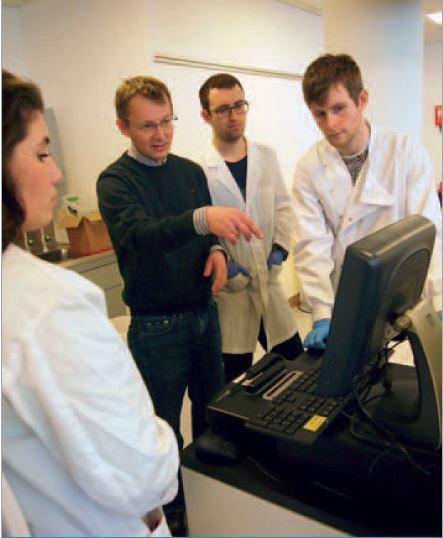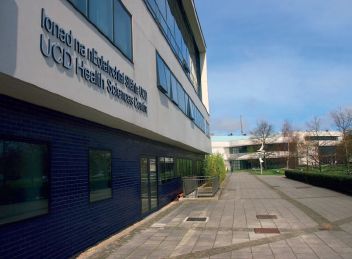
Physiology News Magazine
Physiology at University College Dublin
News and Views
Physiology at University College Dublin
News and Views
Mark Pickering, Anthony Hyland & Paul Mcloughlin
School of Medicine, UCD, Ireland
https://doi.org/10.36866/pn.103.12

Anyone visiting Dublin this year will no doubt notice that the joint meeting of the American Physiological Society and The Physiological Society is not the only major event in the city. 2016 is an important year in Ireland, and Dublin in particular, as it marks the centenary of a key event in Irish history, the 1916 Rising. University College Dublin (UCD) is inextricably linked to this revolutionary period in Irish history, with many students and faculty included amongst the rebels. The university was still relatively young one hundred years ago. In 1908, the National University of Ireland was founded with three constituent University Colleges; Cork, Galway and Dublin. With this act, the Cecelia Street Medical School became the UCD Medical School, and the Professor of Physiology, Denis J. Coffey, was appointed the first president of UCD, a position he would hold for 30 years, spanning the tumultuous period of rebellion that led to the birth of the Irish Republic.
The legacy of UCD in 1916 goes beyond rebellion. The Conway Institute of Biomolecular and Biomedical Research, which opened in 2003 at the UCD Belfield campus, was named in honour of Edward Conway, famous for his work on ion distribution, who would been studying physiology at UCD in 1916. This institute, along with the neighbouring Health Sciences Centre, is the current home of physiology at UCD. While the science and in particular the tools used by physiologists have changed since 1916, many of the same broad questions are still of interest to investigators today. A key strength of physiology research at UCD is the biology of the dissolved gasses in health and disease, a topic that surely would have been of interest to Conway. The current head of physiology in UCD is Prof Paul McLoughlin. His research is broadly focused on the changes in the lung in chronic obstructive pulmonary disease associated with the response to the resulting hypoxia. In recent years this work has highlighted the role of bone morphogenic protein signalling in hypoxia induced pulmonary vascular remodelling and increased pulmonary vascular resistance, revealing a potential new target for therapeutic intervention in this class of diseases.
Other principal investigators in UCD physiology are complementing this research. Dr Christine Costello’s group has examined the role of both chemokine signalling and microRNAs in the pathogenesis of pulmonary vascular disease, while Dr. Katherine Howell’s group has focused on the role of placental growth factor in hypoxic lung disease and the potential therapeutic application of Erythropoeitin for the treatment of emphysema.
Other research is focused on the cellular response to hypoxia, in particular in an inflammatory context. Prof Cormac Taylor’s group has carried out extensive work on the regulation of gene expression responses to hypoxia in epithelial cells. This has led to his demonstration of the effect of hydroxylase inhibitors in reversing symptoms in a model of inflammatory bowel disease. The significance of his contribution to our understanding was demonstrated when Prof Taylor was awarded the 2016 Takeda Distinguished Researcher Award by the American Physiological Society’s Gastrointestinal & Liver Physiology Section, the first time that the award had been made to a scientist from outside the United States.
Dr Eoin Cummins’ group investigates the role of carbon dioxide in gene regulation in inflammatory disease. Dr Cummins will be chairing a symposium on the topic of the physiological gasses at the upcoming joint physiology meeting in Dublin.
A key strength of research in UCD physiology is its diversity. Dr John Baugh’s group’s work relates to both inflammation and hypoxia, but has a particular expertise in fibrosis, specifically in relation to the role it plays in the pathology of heart failure with preserved ejection fraction and pulmonary fibrosis. His research has a strong translational and commercial focus, in particular in relation to work on identifying serum biomarkers in these diseases.
Dr Paul Crossey’s group has an interest in diabetes, and specifically the function of the insulin, growth hormone, IGF-1 axis in insulin deficiency and resistance. His work focuses on genetic mouse models to elucidate these mechanisms, but has involved collaboration with clinicians, specifically looking at foetal placental growth hormone in diabetic pregnancy.


The focus of Dr Mark Pickering’s group is neurophysiology, specifically the interaction between neurons and glia and their mechanical environment, as well as the development of new myelin repair therapeutics and research into the evolution of neural coding in simple models of the nervous system. Dr Stuart Bund’s research interest centres on smooth muscle. While initially focusing on the vascular smooth muscle, his more recent work has concerned the regulation of ureteral motility by periureteral adipose tissue.
The intracellular signalling networks regulating thrombus formation by platelets is the focus of Dr Albert Smolenski’s research group. His work has led to the discovery of new proteins involved in platelet inhibition and regulation of dense granule release. Interestingly, in Dr Smolenski’s research we can see echoes of 1916, the year in which anti-clotting properties of heparin were first discovered.
Strong linkages between research and teaching are fundamental to the educational philosophy of physiology at UCD. As in many universities, the academic staff in physiology in UCD are responsible for the delivery of teaching to a diverse range of students. The largest cohort of students are those undergoing medical training. This includes both a graduate entry medical programme, which admits around one hundred students each year, and an undergraduate entry programme, where the two hundred students taught each year also includes students from our international educational partners in Penang Medical College who join us for the preclinical stages of their training.
As well as the medical programmes, physiologists contribute to a wide range of other degree programmes, including radiography, biomedical engineering, and the BSc in Biomedical Health and Life Sciences. Additionally, around twenty students each year complete a BSc in Physiology as part of the UCD science degree programme, another important focus of our teaching activity. It is in this programme that the linkages between research and teaching are perhaps most evident. For example, in the third year of this four-year programme, students undertake an experimental physiology module. This module is entirely laboratory based, and sees the students spend a full day each week in the lab gaining experience of the application of techniques relevant to modern physiology research, ranging from gene expression analysis and tissue culture through to in vivo invertebrate electrophysiology and the measurement of platelet aggregation. The skills developed by the students are then utilised in their final year as they undertake their final year research projects.
2016 also marks 10 years of the Summer Student Research Awards (SSRAs), a programme in the UCD School of Medicine which allows approximately eighty undergraduates, in particular medicine students, to gain hands on experience of research by carrying out projects during the summer break between teaching terms. These projects are diverse in scope, and include clinical and educational research in addition to laboratory based projects, many of which are supervised by physiologists.
In both cases, these projects are an important element in the training of our students, as in addition to providing real world research experience, they also allow the students to exercise their critical and analytical thinking skills. Most importantly perhaps, they allow the students the space to make mistakes and learn from them, a process any investigator will understand the value of: as James Joyce, another UCD alumnus, wrote in Ulysses; “A man of genius makes no mistakes; his errors are volitional and are the portals of discovery.”
To circle back to where we began, it is interesting to observe how the events of one hundred years ago cascade through history to shape Dublin, UCD, and physiology at UCD today. However, when looking back we should also note another who lived and worked in Dublin one hundred years ago, William Sealy Gosset. While not a physiologist himself, his legacy includes an indelible influence on physiologists (among many others) and some of the fundamental principles on which we build our understanding. While his name may not be familiar to everyone, the pseudonym under which he published (Student, of the eponymous t-distribution and t-test), certainly will be.
Many visitors to Dublin make a pilgrimage to the place he worked for most of his professional life, which is now one of the most popular sites for visitors to Dublin. The fact that his workplace happens to have been the St. James’s Gate brewery, home of the most famous Irish back beer, is surely just coincidental.
